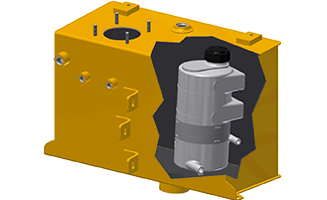Reduction in fluid volume, space claim and weight can save hundreds of dollars per year.

Imagine…a 90% reduction in reservoir size and weight.
The current Cyclone design does not incorporate a return line filter. In order to incorporate an adequate filter for the rated Cyclone flow, yet have sufficient dirt holding capacity, would compromise design integrity. Therefore, the Cyclone is a one-piece molded design, no filters, no nucleation screens and no moving parts (with the noted exception of the optional float switch).
The Eye of the Storm phenomenon, or the calm center of cyclonic activity in nature’s tornado and hurricane, applies to the hydraulic Cyclone reservoir. The center of this reservoir presents less back pressure than its return port connection. By incorporating a drain port at the center-bottom of each Cyclone, sensitive case drain and valve pilot drain ports to return to the Cyclone at essentially zero back pressure.
Cyclone Benefits
- Removal of entrained air
- Reduces the size of the reservoir
- Reduces the space claim of the reservoir
- Reduces the weight of the hydraulic system
- Faster recovery from a large air ingestion
- Reduced sensitivity to machine jostling
- Faster Warm Up
- Lower Installed Cost
The following compares a conventional 20 Gallon reservoir to a 20 GPM
Cyclone, both reservoirs work with a 20 GPM hydraulic pump.
Fact |
Benefit |
| Reduce fluid volume by 18 Gallons | $360 Savings on fluid cost |
| Reduce space claim by 3 Cu. Ft. | $430 Savings on vehicle real estate1 |
| Reduce weight by 200 Lbs | $300 annual fuel savings2 |
| Reduce inventory Sq. Ft. by 75% | $17 Savings per Container per year3 |
| Reduce shipping weight | $19 Savings per unit4 |
1.) Based on a typical $40,000 piece of small construction equipment.
2.) Based on 400 hr/year fuel consumption savings on an 18 hp-hr/gal farm tractor.
3.) Based on cost of warehouse space at $1.25/Sq. Ft. and standard reusable containers 48 x 40 x 45. Can fit 3 times as many cyclones in a container (48).
4.) Based on LTL cost at $.3/Lb
